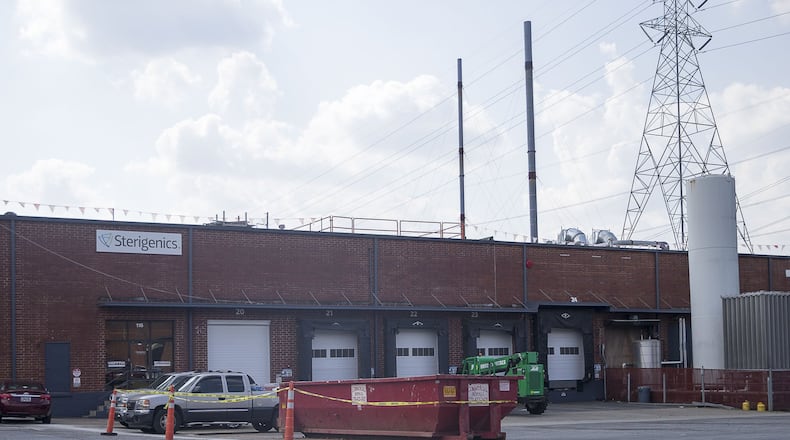Georgia regulators want a controversial Cobb County medical sterilizer to conduct thorough testing of its new emissions controls before the state will grant a new permit allowing it to operate, according to a letter obtained Thursday by The Atlanta Journal-Constitution.
The letter to Sterigenics represents stepped-up enforcement by the Georgia Environmental Protection Division as it seeks to curb emissions of ethylene oxide, a toxic gas that is used to decontaminate medical equipment.
A federal report that raised potential health concerns about ethylene oxide emissions set off an uproar in nearby neighborhoods and has led to stricter state and local regulation of the plant near Smyrna.
Typically, Georgia EPD issues operating permits to emitters, which then have 60 days to perform emissions control testing. That testing data is then used as the basis for emissions standards in the company’s permit.
Here, state regulators are requiring Sterigenics to first prove the effectiveness of its new systems.
“This is to determine if the control devices are as efficient as they say they’ll be,” said Eric Cornwell, a permitting manager at Georgia EPD.
The EPD letter, which is dated Oct. 10, seeks Sterigenics’ testing plans, which the state must approve. Regulators also are requiring performance testing of sterilization chambers, back vents and aeration rooms. It also seeks verification of the efficiency of new systems to capture “fugitive emissions,” or those that previously were not captured by the plant.
“The additional enhancements to our control systems are nearly completed, and Sterigenics agrees with EPD that the next step in the process is to demonstrate the effectiveness of the enhancements, the purpose of which is to further reduce ethylene oxide emissions below already safe levels,” Sterigenics said in a statement to the AJC.
In July, media reports about the federal Environmental Protection Agency's National Air Toxics Assessment triggered a firestorm of controversy involving the Sterigenics facility and the Becton Dickinson plant in Covington east of Atlanta.
The report flagged census tracts near the plants as having the potential for high-rates of cancer from long-term exposure to ethylene oxide. The report was based on mathematical modeling, not air tests. Subsequent modeling by Georgia EPD significantly narrowed the zones of potentially harmful long-term exposure.
Both facilities have since committed to installing millions of dollars in new emissions controls.
In August, Sterigenics entered into a consent order with Georgia EPD. Sterigenics suspended operations at the Cobb plant later that month in order to install the new equipment it said would reduce emissions ofthe flammable, carcinogenic gas.
But the company came under fire from Gov. Brian Kemp's office when it announced it was expediting construction without giving the state a chance to assess its proposal. Sterigenics has not completed the upgrades because the company is battling Cobb County over its building permit. The county has moved to reclassify the building from storage to high hazard industrial, but Sterigenics argued in a letter sent to Cobb officials that it has the proper high hazard industrial zoning.
The EPD letter said regulators expect the company to complete and submit its tests and engineering analysis to the state in 30 days, pending any required approvals of building permits by Cobb officials.
Janet Rau said the group she leads, called Stop Sterigenics Georgia, hired an expert who evaluated Sterigenics’ prior emissions tests and expressed concerns about reliability to Georgia EPD.
She said it appears those concerns about Sterigenics’ past tests have been incorporated into the state’s evaluation of Sterigenics’ new permit.
“We’re glad they read that and are acting on it,” Rau said. “The only concern we have right now is that it appears they’re letting Sterigenics choose the company that’s doing this evaluation.”
The state typically lets a regulated company hire a third-party to test emissions controls. Those tests are vetted by Georgia EPD regulators.
Keep Reading
The Latest
Featured






